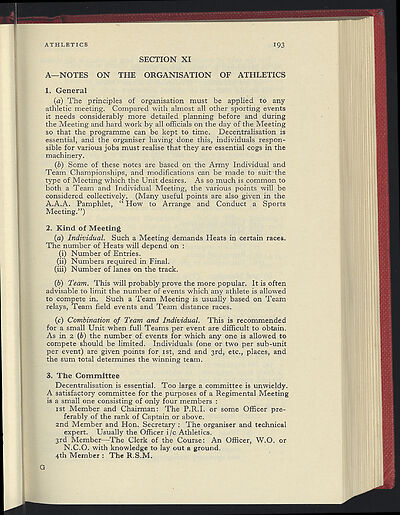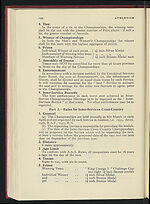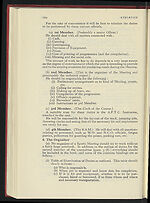1957-58
(207)
Download files
Complete book:
Individual page:
Thumbnail gallery: Grid view | List view

ATHLETICS
1
93
SECTION XI
A—NOTES ON THE ORGANISATION OF ATHLETICS
1. General
(a)
The principles of organisation must be applied to any
athletic meeting. Compared with almost all other sporting events
it needs considerably more detailed planning before and during
the Meeting and hard work by all officials on the day of the Meeting
so that the programme can be kept to time. Decentralisation is
essential, and the organiser having done this, individuals respon-
sible for various jobs must realise that they are essential cogs in the
machinery.
(b)
Some of these notes are based on the Army Individual and
Team Championships, and modifications can be made to suit the
type of Meeting which the Unit desires. As so much is common to
both a Team and Individual Meeting, the various points will be
considered collectively. (Many useful points are also given in the
A.A.A. Pamphlet, " How to Arrange and Conduct a Sports
Meeting.
")
2. Kind of Meeting
(a) Individual.
Such a Meeting demands Heats
in
certain races.
The number of Heats will depend on
(i) Number of Entries.
(ii) Numbers required in Final.
(iii) Number of lanes on the track.
(b) Team.
This will probably prove the more popular. It is often
advisable to limit the number of events which any athlete is allowed
to compete in. Such a Team Meeting is usually based on Team
relays, Team field events and Team distance races.
(c)
Combination
of
Team and Individual.
This is recommended
for a small Unit when full Teams per event are difficult to obtain.
As in 2 (b) the number of events for which any one is allowed to
compete should be limited. Individuals (one or two per sub-unit
per event) are given points for 1st, 2nd and 3rd, etc., places, and
the sum total determines the winning team.
3. The Committee
Decentralisation is essential. Too large a committee is unwieldy.
A satisfactory committee for the purposes of a Regimental Meeting
is a small one consisting of only four members :
Ist Member and Chairman: The P.R.I. or some Officer pre-
ferably of the rank of Captain or above.
2nd Member and Hon. Secretary: The organiser and technical
expert. Usually the Officer i/c Athletics.
3rd Member.—The Clerk of the Course: An Officer, W.O. or
N.C.O. with knowledge to lay out a ground.
4th Member: The R.S.M.
G
1
93
SECTION XI
A—NOTES ON THE ORGANISATION OF ATHLETICS
1. General
(a)
The principles of organisation must be applied to any
athletic meeting. Compared with almost all other sporting events
it needs considerably more detailed planning before and during
the Meeting and hard work by all officials on the day of the Meeting
so that the programme can be kept to time. Decentralisation is
essential, and the organiser having done this, individuals respon-
sible for various jobs must realise that they are essential cogs in the
machinery.
(b)
Some of these notes are based on the Army Individual and
Team Championships, and modifications can be made to suit the
type of Meeting which the Unit desires. As so much is common to
both a Team and Individual Meeting, the various points will be
considered collectively. (Many useful points are also given in the
A.A.A. Pamphlet, " How to Arrange and Conduct a Sports
Meeting.
")
2. Kind of Meeting
(a) Individual.
Such a Meeting demands Heats
in
certain races.
The number of Heats will depend on
(i) Number of Entries.
(ii) Numbers required in Final.
(iii) Number of lanes on the track.
(b) Team.
This will probably prove the more popular. It is often
advisable to limit the number of events which any athlete is allowed
to compete in. Such a Team Meeting is usually based on Team
relays, Team field events and Team distance races.
(c)
Combination
of
Team and Individual.
This is recommended
for a small Unit when full Teams per event are difficult to obtain.
As in 2 (b) the number of events for which any one is allowed to
compete should be limited. Individuals (one or two per sub-unit
per event) are given points for 1st, 2nd and 3rd, etc., places, and
the sum total determines the winning team.
3. The Committee
Decentralisation is essential. Too large a committee is unwieldy.
A satisfactory committee for the purposes of a Regimental Meeting
is a small one consisting of only four members :
Ist Member and Chairman: The P.R.I. or some Officer pre-
ferably of the rank of Captain or above.
2nd Member and Hon. Secretary: The organiser and technical
expert. Usually the Officer i/c Athletics.
3rd Member.—The Clerk of the Course: An Officer, W.O. or
N.C.O. with knowledge to lay out a ground.
4th Member: The R.S.M.
G
Set display mode to:
![]() Universal Viewer |
Universal Viewer | ![]() Mirador |
Large image | Transcription
Mirador |
Large image | Transcription
| Games and sports in the army > 1957-58 > (207) |
|---|
| Permanent URL | https://digital.nls.uk/248853688 |
|---|
| Description | 'Games and Sports in the Army' was an annual publication produced by the British War Office between the 1930s and 1960s. This included the Second World War. It outlines the rules and regulations for games and sports played by members of the armed forces. It features names and photographs of team members, and examples of contemporary advertising. |
|---|---|
| Shelfmark | GWB.52 |

